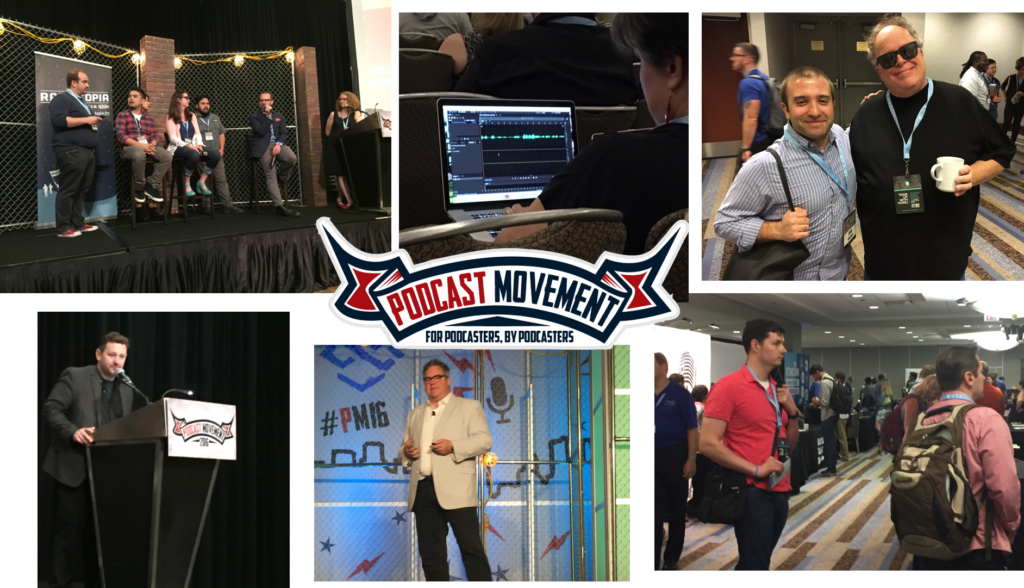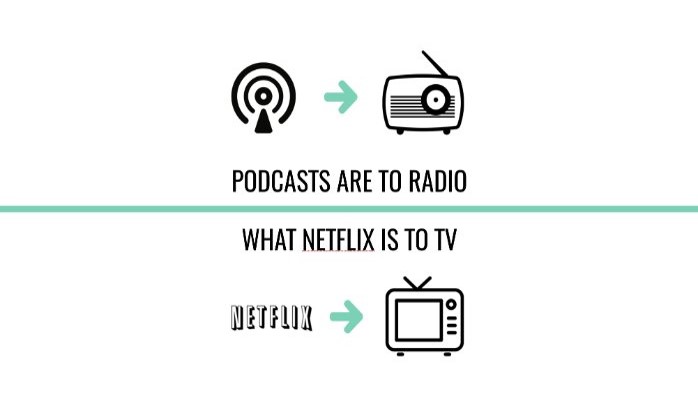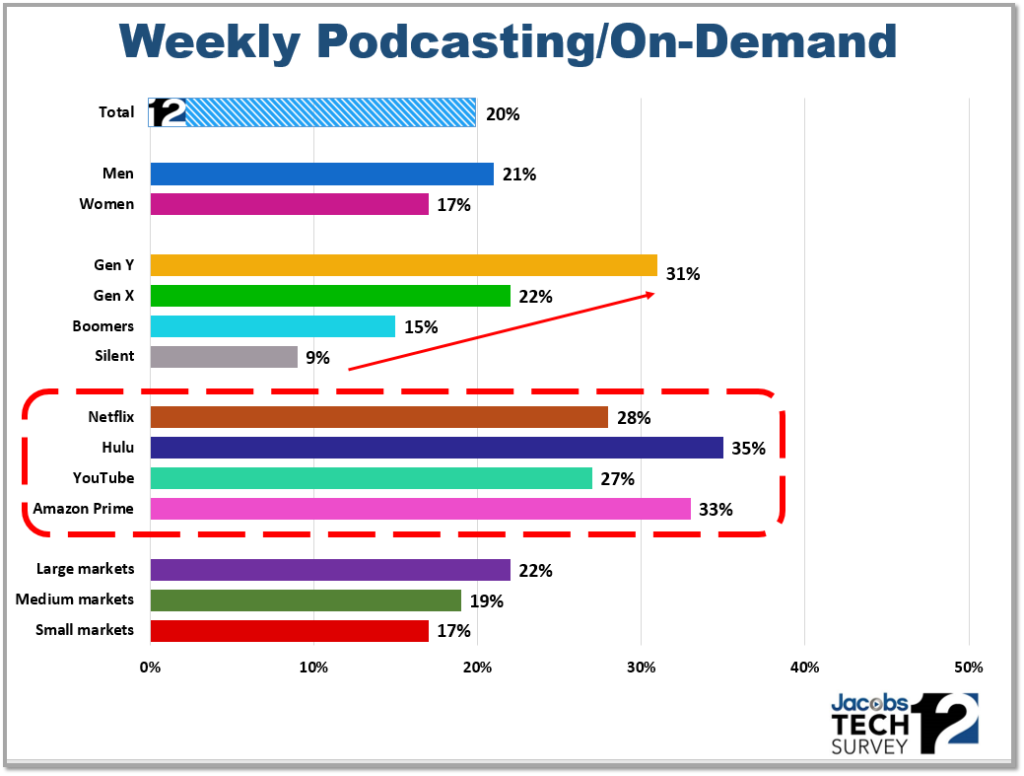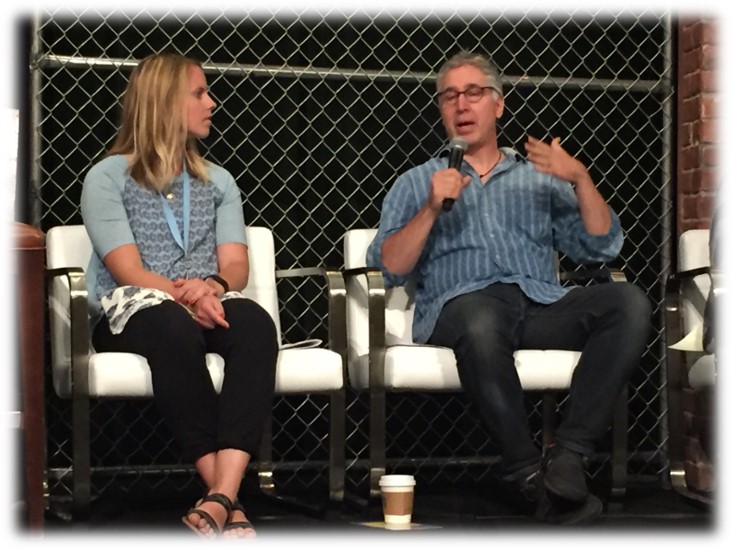
It’s amazing when events come together that remind you that something very big may be happening. I spent the latter part of last week in Chicago at the Podcast Movement conference. It was my first, and I was excited to be in an atmosphere that radiated energy and optimism. Audio is most certainly enjoying a renaissance, and podcasting is a contributing factor.
On the way home, I ran across an article in LinkedIn by Pacific Content’s Steve Pratt: “Podcasting Is Having Its HBO Moment And Its Netflix Moment At The Same Time.” It resonated for me because it outlined the key challenges and opportunities facing podcasting at this pivotal time in its history.
You got that feeling throughout the many great sessions at Podcast Movement, where seemingly everyone wants to launch their own podcast (or already has). Pratt says there have been two waves of podcasting:
-
First Wave – Democratization of Audio
This wave started way back at the beginning of the podcasting craze. The barrier to entry was low, and anyone could create a podcast in their basement or bedroom. Of course, this wave produced a lot of podcasts that were wild, unedited, self-indulgent, and not very good.
-
Second Wave – The HBO & Netflix Moments
Pratt says this next wave was facilitated by Apple’s Podcasts app, along with the launch of the seminal Serial podcast. These events redefined podcasting, ushering in quality programming.
And his graphic below does a beautiful job of describing how our brains are being rewired by the power of on-demand, especially when it comes to the television revolution. An exponentially growing number of consumers have changed the way they watch TV over the past few years, opting for watching want they want, when they want, wherever they want. And these patterns are porting over to the radio business with podcasting being the platform that’s analogous to Netflix:
 Our research reveals this same phenomenon. There is a direct relationship between those who have become accustomed to watching their favorite shows and videos via on-demand platforms, and those who are now moving in this same direction with audio. Among the most regular consumers of podcasts and on-demand programming – those who listen weekly – we’re seeing the most robust metrics who regularly use television platforms like Netflix, YouTube, Hulu, and Amazon Prime. What’s happening in television is clearly impacting audio consumption, and ultimately, radio listening:
Our research reveals this same phenomenon. There is a direct relationship between those who have become accustomed to watching their favorite shows and videos via on-demand platforms, and those who are now moving in this same direction with audio. Among the most regular consumers of podcasts and on-demand programming – those who listen weekly – we’re seeing the most robust metrics who regularly use television platforms like Netflix, YouTube, Hulu, and Amazon Prime. What’s happening in television is clearly impacting audio consumption, and ultimately, radio listening:

It is also noteworthy that the most committed podcasting and on-demand audio consumers skew young. And that was reflected in the crowd at Podcast Movement. Not only are the heaviest podcast listeners Millennials, but it also appeared that many of the attendees hail from that generation, too. That’s a big part of what makes this space and this conference so exciting. Exuberance, optimism, and passion are all ingredients that were very evident at Podcast Movement.
But change is in the air. The subtitle of Pratt’s article is worth considering, because as he points to podcasting’s powerful potential, he also throws out a caution:
Why Your Company Should NOT Make Your Own Podcast
And so today, Pratt says there’s a “blue ocean” of podcasting, meaning the space is wide open. But the implications of the HBO and Netflix phenomena for podcasting are now morphing into a demand for quality. And that’s where so many of the fledgling podcasters at Podcast Movement have much room for growth. The “Wild West” days may be rapidly coming to an end as podcasting becomes even more accessible on Android phones.
At the conference, professional podcasters such as Roman Mars and Tom Leykis were in attendance. And Audible’s Eric Nuzum presented his company’s new vision for on-demand programming – a series of what will become 40 “Originals.” Eric rolled out several of these – well-crafted programs that are designed to enchant and surprise. You can sample the first batch here. f
The essence of Audible’s initiative is to “create best-in-class audio programs, then connect them to the audience most likely to love them.” For a company launched by Amazon, and run by a pro like Nuzum, that’s an achievable goal.
For the other 97% of podcasters in attendance, that’s a much more difficult standard to aspire to. And that’s why Pratt makes the point that so many podcasts aren’t ready for prime time. They reflect a certain grassroots creativity that is charming, but the quest for quality and professionalism makes the space difficult to navigate.
At Podcast Movement, producers, talent, and writers ran the gamut, featuring long tail programs that might be about health and wellness, woodworking, car loans, or scrapbooking. Many are still caught up in Pratt’s “first wave,” unable to make the leap into the league of critical mass that translates to large audiences and sustainable profits.
Nuzum compares the state of the art of podcasting today to a flea market. You have to sift and rummage your way through a lot of crap in order to find content that truly is enjoyable and worthy of your time.

We saw this up close in Seth Resler’s “Podcast Makeover” session at the conference. Seth brought on two fledgling podcasters, and moderated a live aircheck session featuring Tom Leykis, Valerie Geller, Doug Berman (Executive Producer of NPR’s Car Talk and Wait Wait…Don’t Tell Me!, and Spreaker’s Rob Greenlee. It was a great session, but underscored the notion that many podcasters have a great deal to learn about prep, interviewing techniques, editing, and other fundamentals key to creating compelling audio content.
And that’s why the radio broadcasting industry is at an inflection point with podcasting. Yes, public radio has led the way, but largely by repurposing its already sticky and well-produced programming like This American Life and Fresh Air. The ability to create fresh new on-demand content like what WNYC is doing or NPR has accomplished with Invisibilia is where the potential lies.
And with a serious commitment from commercial broadcasters, radio could be part of a “third wave,” where stations are able to meld their talent with its built-in production know-how and experienced sellers. Given the seismic shift toward on-demand programming, radio has the great potential to create more diverse content, escape the pressure of ratings, use its mighty reach to attract consumers, and generate serious profits.
For me and others who come out of the radio industry, that was the promise and potential of this conference, one that we will most certainly return to, bringing others along with us.
Podcasting – is it a movement, a moment, or something altogether different? That’s where we’re headed.
Tomorrow, we’ll talk to many of the radio people in attendance at Podcast Movement to get their “take” on the conference and why it matters to broadcasters.
For a look at the spirit of Podcast Movement 2016, check out this short video:
We’ve also launched our own podcast, the DASH Podcast series featuring backstage interviews from the DASH Conference with movers & shakers in and around the auto industry.
- In Radio, You Just Never Know - April 17, 2025
- The Secret To Making A Great Podcast (And Great Radio) - April 16, 2025
- I Read The (Local) News Today, Oh Boy! - April 15, 2025




IMHO, the most important sentence:
“And that’s why the radio broadcasting industry is at an inflection point with podcasting.”
I have always said that radio should, today, BE the dominant player… much like NPR is PERCEIVED to be. From an outsider’s perspective, it was a natural but the industry blew it.
Guess what?
You are now getting a SECOND CHANCE!
Huh.
That doesn’t happen very often.
And hopefully, radio will take the “podcasting ball” and run with it. The potential to do great things that expand brands, grow audiences, and generate revenue is there. Thanks for the comment, Rick.
This tweet from your company absolutely floored me:
“Less than 1% of #podcast content comes from commercial #radio broadcasters.”
I forget which panel that was from but talk about an opportunity. It is time to harness the podcast movement/moment, and it was heartening to see so many broadcasters and broadcast companies represented at PM16. A good sign indeed.
I love listening for podcasts. I am glad they are popular
Thanks!